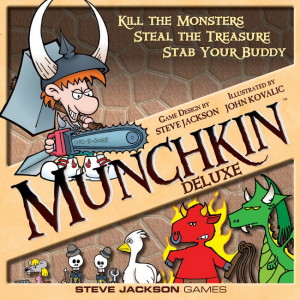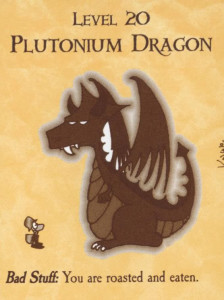I remember the first time dove into the world of deep, strategic game play. The feeling that comes from thinking through moves that exist only in a hypothetical world of possible outcomes as the opponents’ decisions guide my own. At the end of a good session, it’s just satisfying to see what you’ve wrought stretched out before you.
Whether expanding your empire through ancient, magical lands to bend the very earth to your will or simply shipping goods through the Panama Canal, these games are not about luck or the odd dice roll. They are calculated stratagems interwoven and honed to a fine edge in order to secure victory. It is a powerful feeling that stirs in a persons gut, and I understand completely why some players who have tasted that power view other, lesser games as inferior.
So what happens when a game just comes out and asks, “I kick down the door. What do I see?”
 Since its creation, the game of dungeon delves, backstabbing adventurers, and more inside jokes than you could shake a ten foot pole at has expanded to conquer a number of genres that geek culture holds dear – space
Since its creation, the game of dungeon delves, backstabbing adventurers, and more inside jokes than you could shake a ten foot pole at has expanded to conquer a number of genres that geek culture holds dear – space, vampires
, Lovecraft
, and the apocalypse
just to name a few. Spyke, the games most munchkiny of all mascots, has even busted out of his own gaming world and into other
games
!
With such a host of products flooding the market without any signs of slowing, one might get the impression that Munchkin was a universally lauded champion of what is good and right in the gaming world today. However, in my own experience, I have seen few games that are as polarizing as Munchkin by Steve Jackson Games.
Let’s start with the basics, because that’s what Munchkin is best at. The game boils down all the tropes of old school tabletop RPGs into their simplest of forms. Kick in the door, kill the monster, grab the loot, level up. Lather, rinse, repeat until someone reaches level 10 and wins the game. While there is more to the game than that – it isn’t much.
Players pull a card that shows some boon, curse, or monster, and react accordingly. Its proponents will say that the fun of this game appears when fighting difficult monsters. The player can use items or recruit fellow adventurers to join him for a share of the loot. All the while the other players can use cards they have to make monsters even bigger and fiercer than before. The back and forth provides them with a lot of fun with each new card.
Munchkin’s detractors look at exact same experience and wonder if it should even be called a game at all in the strictest sense. There is no real strategy other than make your numbers higher than the monster’s numbers or vice versa.
If a player gets a bad run of luck with the door cards he flips over – he might be rendered completely unable to get beyond the first two or three levels for the entire game. Having been caught in that very situation myself, I can tell you that it is miserable. You can’t do much else than watch the rich get richer with gear and cards, while all you can do is pray that your next door card reveals the Potted Plant.
Life is no picnic for people who do rise in the ranks either, as many of these games end with multiple players at level 9 – causing all other players to make it their life’s work to ruin them. At the higher levels, this game can be one of attrition rather than strategy.
 Personally, I both love and hate this game at the same time. If I’m playing with friends and someone says “Let’s play Munchkin,” I don’t shy away from the game. I’ve been around D&D long enough to know why the game’s Level 8 Gazebo monster is hilarious, and I enjoy playing the shyster that gets his friends to do his bidding for personal gain.
Personally, I both love and hate this game at the same time. If I’m playing with friends and someone says “Let’s play Munchkin,” I don’t shy away from the game. I’ve been around D&D long enough to know why the game’s Level 8 Gazebo monster is hilarious, and I enjoy playing the shyster that gets his friends to do his bidding for personal gain.
At the same time, I see its flaws in stark contrast. Having seen all the cards in the deck multiple times, the surprising hilarity I once loved about it is gone, reminding me that the game breaks down to flip a card, … , profit. While I’ll agree to play it with friends, it will probably only be after a failed attempt to steer them towards something else. It was from this neutral place that I wondered why so many in the community HATE this game.
After dissecting negative reviews and comparing them to their positive counterparts, a theme began to emerge. Whether the person had a positive or negative opinion was based on their need to feel in control. Strategy gamers despised Munchkin for its randomness and its “take that!” nature. There are no plans to make and nothing to change the course of the game. The end game might build a bit of tension only to be deflated when the last player flips over a level 1 monster and crushes it with her pinkie toe to win.
But is that always such a bad thing?
 We all want to be in charge. We want, even need, to make our own decisions and forge our own path. Where that isn’t the case – we need to know that there is something we can do to fix it. Look at any element of modern technology and you can trace back through the years and see how people wanted to fix a problem that made their life difficult.
We all want to be in charge. We want, even need, to make our own decisions and forge our own path. Where that isn’t the case – we need to know that there is something we can do to fix it. Look at any element of modern technology and you can trace back through the years and see how people wanted to fix a problem that made their life difficult.
But what happens when that ambition is all there is? What happens when even the best intentions and loftiest goals are withheld? The danger in control is that it can lead to tunnel vision. The goal becomes all that there is. Anything else is emptiness. And this is exactly why I think Munchkin fails for people.
The people who love Munchkin are often considered “casual” gamers. They aren’t looking for a two to six hour epic strategy. They are looking for something fun to do with their friends on an otherwise boring night. They laugh, joke, point out hilarious artwork, and tell stories that start with “Remember that one time when…?”
When asked about the previous day’s gaming, Munchkin players don’t talk about who won, and sometimes can’t even remember. Yet they will spend a half hour talking about the ridiculous gear list they accumulated or the time their friend got the curse that changed their gender. The goal is overshadowed by the moments that lead to it.
We all make goals and pursue them. Mine range from small, simple achievements to life changing aspirations. I’ve also gone far enough down the road that I can point to a pile of that have not, and may never, be achieved. I’ve seen the heaviness that descends on a person when the tunnel vision has set in on a goal that they can’t make a reality. I have felt it myself, and have had my back broken trying to carry it.
What Munchkin taught me is that I don’t really have control of anything. Whether it’s random circumstance, opposition, or even the right hand of God Himself, full control is never entirely in the hands of any one person. The best we can do is mitigate it, but sometimes we just aren’t dealt the cards we need to do what we want to do. At that point all we can do is roll with it, and that’s a valid option.
Why not value the moments that lay before us? One of the hardest lessons I’m still learning is that I’m not the one running the game. I’m one of the players in it. It is painful when the story I’m trying to ad lib gets shut down by the GM, but it’s also kind of freeing. Because when control stops – you find trust. And I’m pretty confident the game master is cooking up an awesome adventure. I’m gonna open any door I can to until I find it.




